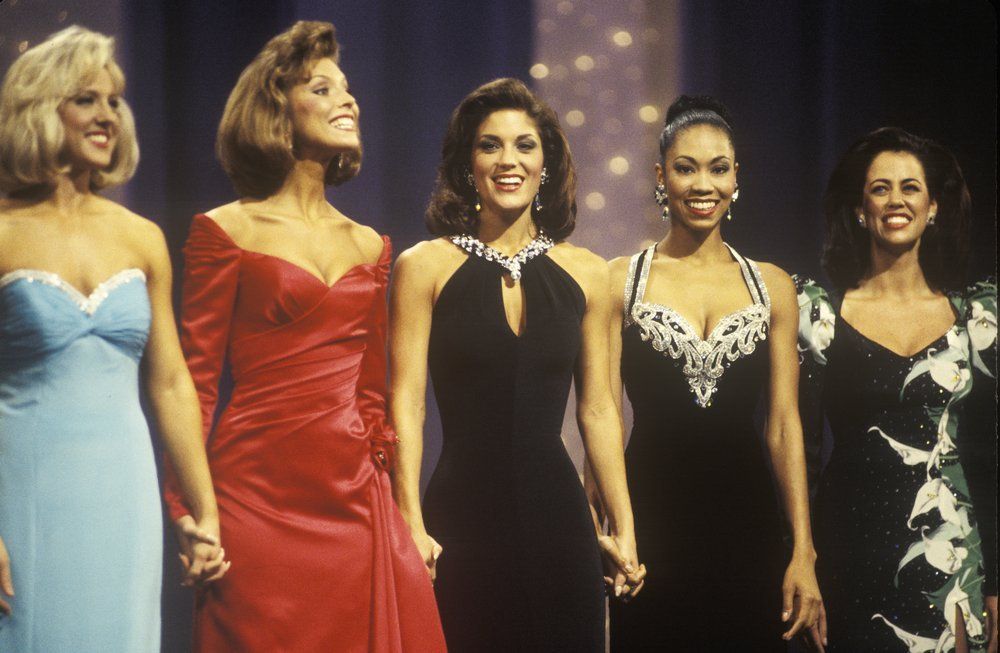THE LEORA LETTER
Boys will be boys…and girls will be sluts.
April 13, 2022

“Slut,” “hoe,” and “thot” are slippery and subjective terms that can apply to any girl or woman, regardless of how they dress or behave. I shed light on slut-shaming—how and why assumptions about being “too” sexual are applied, the consequences for women, and the impact on everyone, regardless of gender.
Slut-shaming matters because when people are dismissed as sluts, hoes, and thots, they are denied care and compassion in a variety of situations, including when they are sexually harassed, sexually assaulted, and need an abortion.
Q&A with Fiona Lowenstein
Complete this sentence: “Miss America is a __________.”
(a) Beauty pageant (b) Scholarship program (c) Site of iconic 1968 bra-burning protest.* (Scroll down to find the answers.)
Stumped? The best person to explain Miss America is a genderqueer feminist journalist who participated as a contestant—Fiona Lowenstein.
Lowenstein, 28, immersed themself into the Miss America world in 2014-15. Crowned Miss Stamford, they participated in the Miss Connecticut competition as a finalist. Lowenstein went on to speak with approximately 20 trans or gender-nonconforming teenagers and young adults who also had competed in the Miss America system. Their fascinating and important article about LGBTQ+ experiences, which appeared in Teen Vogue, may surprise you. (Hint: There are some pockets of resistance to heteronormative femininity.) One of the many illuminating takeaways from Lowenstein’s piece for me was the way the experiences of contestants align with the experiences of so many of us.
I spoke to Lowenstein—a producer, speaker, and journalist—about the events that motivated them to compete; what they observed about expectations and pressures for women’s appearance; and, of course, about the role of slut-shaming.

Leora Tanenbaum: Before you entered the Miss America competition, what did you know about it? And what prompted you to enter the competition in the first place?
Fiona Lowenstein: I didn't have a deep knowledge of the Miss America system at all before I participated. I grew up in New York City and never watched Miss America on TV. I couldn't have told you the differences among Miss America and Miss Universe and Miss USA. And then, when I was a sophomore in college, I was a part of the Yale International Relations Association and produced an event series. That year, the first Miss America of South Asian descent, Nina Davuluri, was crowned, and there were a lot of racist and xenophobic comments about her on social media. So I thought it would be interesting to invite her to speak about her experiences. When I prepared for the event, I watched a bunch of old Miss America competitions on YouTube, including the one that she had participated in. What I saw was a lot of women in bikinis and sparkly high heels. There wasn't a whole lot of intellect being displayed on stage. That's not to say that it didn't exist. But that's just not what the competition was highlighting.
But when Nina Davuluri came to campus and spoke, I was really impressed. She reminded me of a politician in that she was great at interacting with everyone and kind of making them all feel seen the way that she was pushing her platform, which was about diversity and cultural competency. Here she was, speaking at Yale, and she was around 25 years old—and the next day, she was going to another state to promote her platform with elected officials.
I realized that being Miss America is actually an incredible opportunity. The following year, I was in an upper-level journalism class, and we had an assignment to immerse ourselves in a world unlike our own and then write about it.
Tanenbaum: You wrote in Teen Vogue that when you were crowned Miss Stamford in 2014, you strutted across the stage “in nothing but a bikini and a pair of heels.” Did you have to wear that outfit under the rules at that time? And when you walked on that stage, did you feel objectified?
Lowenstein: The rules at the time were that you had to participate in a swimsuit competition. When I competed at Miss Stamford, which was my local competition, I did not wear a bikini—I think I wore my mom’s tankini from L.L. Bean. The norm was that you also wore heels. When I competed at the next level, for Miss Connecticut, they gave us all bathing suits. And my understanding was that we had to wear the bathing suit they had given us. And to be honest, it did not occur to me to push back because my project was to try to have the most authentic experience as possible as long as it didn't harm my academic career or alter my appearance permanently. So, for example, I refused to do the tanning beds, but I did do the spray tanning.
I have talked to plenty of people who have participated in this system who found it empowering to walk on stage in a bikini in heels. But for me, I felt sickened by it. I disassociated myself from the person on the stage. Mostly, I had to focus on not tripping in the high heels.
I tried to think of myself as a supermodel and get into the experience, but I just couldn’t feel sexy. When I do feel sexy, I am typically not wearing an outfit like that. That’s not, you know, what generally goes with my gender expression.

Contestants in the 1994 Miss America Pageant, Atlantic City. Photo: Shutterstock.
Tanenbaum: Did you experience or witness situations where there was slut-shaming?
Lowenstein: Yes, when I participated, there was a very strong “politics of respectability” at play in the Miss America organization. They talked about women’s empowerment, and women leaders, but at the same time, it was clear to me that you could not become Miss Connecticut, and certainly not Miss America, if you were going out on lots of dates, for example. And there was essentially only one way to look—to be sexy, but not too sexy. It was okay to wear a dress with a plunging neckline, but it had to be in baby pink, not red. And it was okay to do a sexy dance as your talent, but then your interview had to be very polished. I had a nose ring at the time, but I took it out to participate, and there were girls with tattoos who covered them up.
And there were a lot of incredibly infantilizing rules that felt like an attempt to prevent the slut persona from circulating. For example, there were numerous situations when you needed to have a chaperone. You were not allowed to wear the crown and sash when you were driving a car, though you could wear them when you were in the passenger seat. Another title holder told me that she once got in trouble for having a glass of wine at an Italian restaurant with some girlfriends; they said it looked like she could have been partying. You were not allowed to go to the bathroom without bringing a buddy with you. Remember, these are people between the ages of 17 and 25.
Tanenbaum: What was the reason for the bathroom rule?
Lowenstein: I think it was due to a fear that strange men could come after you and follow you into the bathroom. When you put on the crown and sash, it was very much like waving a sign that said, “Hey, random men, come ask me questions that are inappropriate.” That happened all the time when we did public appearances. At one basketball game at the University of Connecticut, a few drunk guys came up and said lewd things. And you had to smile and keep this level of decorum. You certainly could never give out your number or go out with any man you met that way. So the bathroom rule was to protect us from the leering men. But it was the leering men who were watching Miss America a lot of the time.

Key takeaway: Miss America contestants—they’re just like us! Encouraged to appear sexy—but not too sexy—in a stereotypically heteronormative way, they are then told they need to be “protected” from harassment and assault, or are blamed for being harassed and assaulted because they look sexy.
Quiz Answer
*(a) Miss America strenuously denies that it is a beauty pageant. (b) It is one of the largest providers of scholarship assistance to young women in the world. (c) No one burned bras at the 1968 protest.
Share Your Story
Have you been sexualized against your will? How did this experience make you feel, and did you push back—or not? Email me at leora@leoratanenbaum.com and let me know if I may quote you—anonymously—in a future issue of this newsletter.
Recent USA Today Commentaries
Nose Job at 14: How Young Is Too Young for Plastic Surgery? | USA Today | Jenna Ryu
Bella Thorne, Slut-Shaming, and the Consequences for Women | USA Today | Jenna Ryu